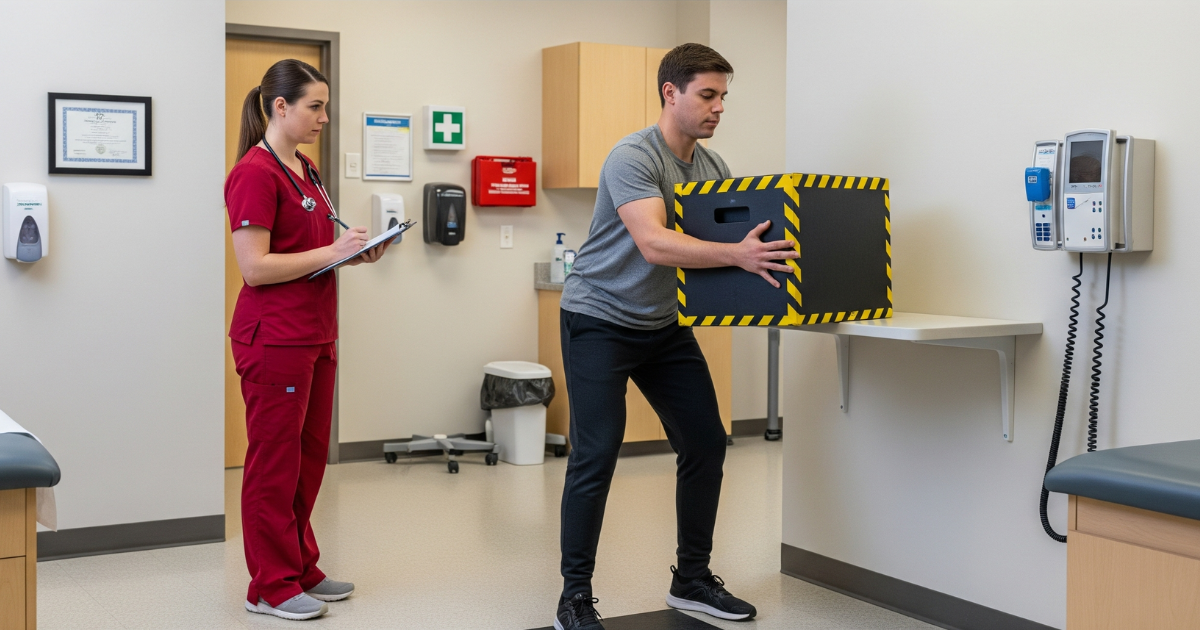According to the U.S. Bureau of Labor Statistics, over 2.8 million nonfatal workplace injuries and illnesses were reported by private industry employers in 2022 alone, with many incidents involving strains, sprains, and overexertion injuries that could have been prevented with proper physical screening. In physically demanding or safety-sensitive roles, especially in transportation, construction, and oil and gas, ensuring that employees are physically able to perform essential job duties isn’t just a safety measure; it’s a compliance requirement and a risk management strategy.
For employers and safety managers in DOT-regulated industries, Functional Capacity Evaluations (FCEs) and physical abilities testing play a critical role in reducing workplace injuries, supporting return-to-work decisions, and meeting regulatory standards. Understanding how these evaluations work, and how they differ, helps you make smarter decisions that protect both your workforce and your bottom line.
What is a Functional Capacity Evaluation?
A Functional Capacity Evaluation (FCE) is a comprehensive clinical assessment that evaluates a person’s physical capabilities in relation to job-specific tasks. It is typically administered by a licensed physical or occupational therapist and can last several hours depending on the scope of testing. The evaluation is used to measure strength, endurance, flexibility, range of motion, and overall functional performance, helping determine whether an individual can safely return to work, continue in a specific role, or may need job modifications or accommodations.
FCEs are commonly used in workers’ compensation cases, post-injury return-to-work decisions, and disability evaluations, as they provide objective data that can support or challenge medical and legal claims. They are also used to guide rehabilitation plans and document medical necessity for continued treatment.
In DOT-regulated or safety-sensitive industries, understanding an employee’s functional capacity is particularly important. Functional assessments can help employers comply with federal requirements set by agencies like the Federal Motor Carrier Safety Administration (FMCSA), which mandates that commercial drivers meet specific physical qualifications to perform their duties safely. FCEs may also be used as part of a broader fitness-for-duty evaluation, reducing employer liability and enhancing workplace safety.
How FCEs Relate to Physical Abilities Testing
Although often confused, Functional Capacity Evaluations (FCEs) and physical abilities testing (PAT) serve different but complementary purposes. PAT is typically used in pre-employment or routine evaluations to determine whether a candidate can meet the physical demands of a specific job, with standardized tasks like lifting, carrying, or climbing. FCEs, however, are more detailed assessments often initiated post-injury or during return-to-work planning, incorporating medical history, pain reports, and observed effort to assess broader functional performance and safety readiness. Both tools are critical in high-risk environments, as they help employers proactively reduce workplace injuries and ensure that employees are physically suited for their roles.
The Importance of Physical Readiness in Safety-Sensitive Roles
In industries where a single lapse in physical readiness could endanger lives, it is essential that hiring and return-to-work decisions are based on accurate, medically sound data. This is particularly true for roles that involve operating commercial vehicles, heavy machinery, or working in hazardous environments. FCEs and physical abilities testing provide employers with objective data that supports safe staffing decisions and may be used as part of a legally defensible strategy for employment actions. These measures help ensure regulatory compliance while promoting a safer and more productive workforce.
Why Choose MedPhysicals Plus for Functional Capacity Evaluations and Physical Abilities Testing in Alaska
MedPhysicals Plus is Alaska’s trusted provider for Functional Capacity Evaluations and Physical Abilities Testing, helping employers in DOT-regulated and safety-sensitive industries make informed hiring and return-to-work decisions. Our evaluations are job-specific, compliant, and conducted by licensed professionals, ensuring your workforce meets the physical demands of the job safely and legally.
We also offer employee drug testing services with flexible mobile and on-site options, ideal for remote or high-turnover worksites. With locations in Anchorage, Fairbanks, Wasilla, and Soldotna, we serve businesses statewide with reliable, expert support.
Ready to protect your workforce and ensure compliance? Contact us today to schedule a consultation or implement a testing program that meets your needs.

